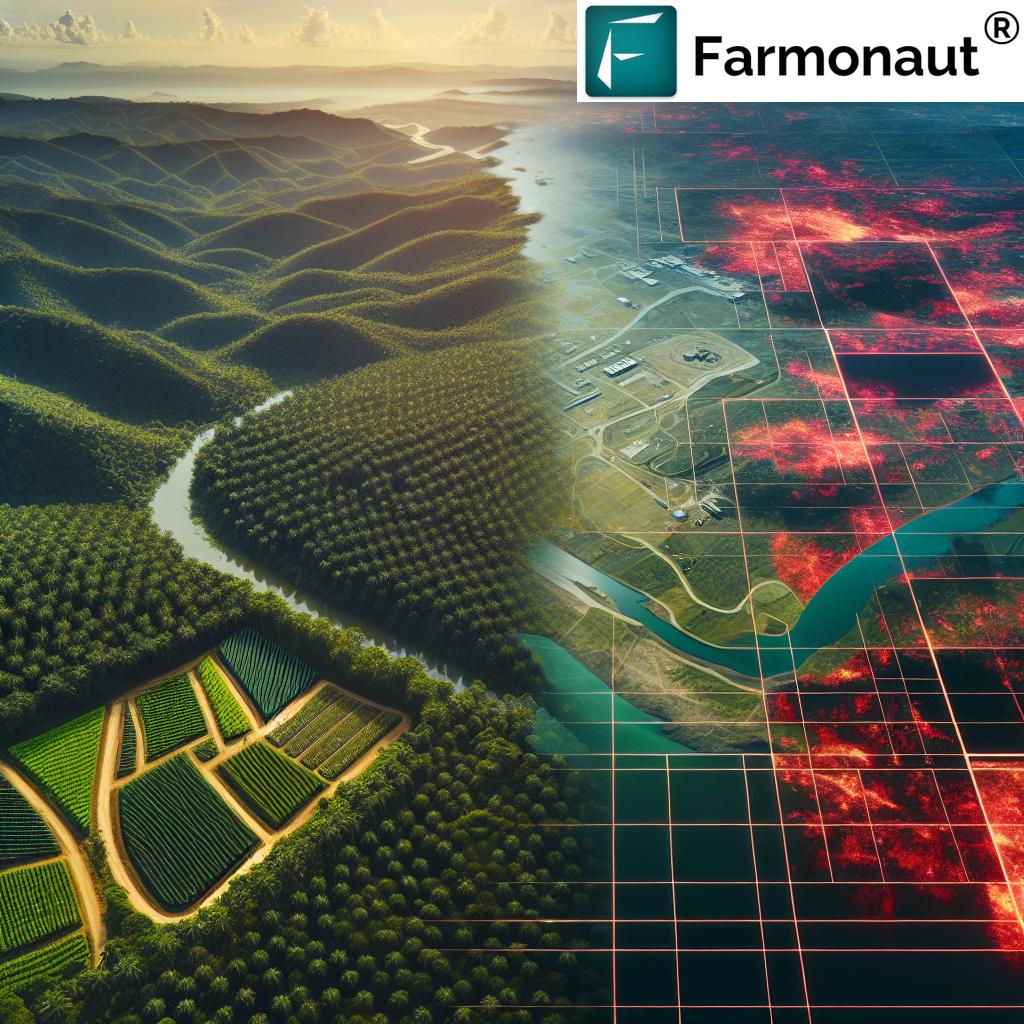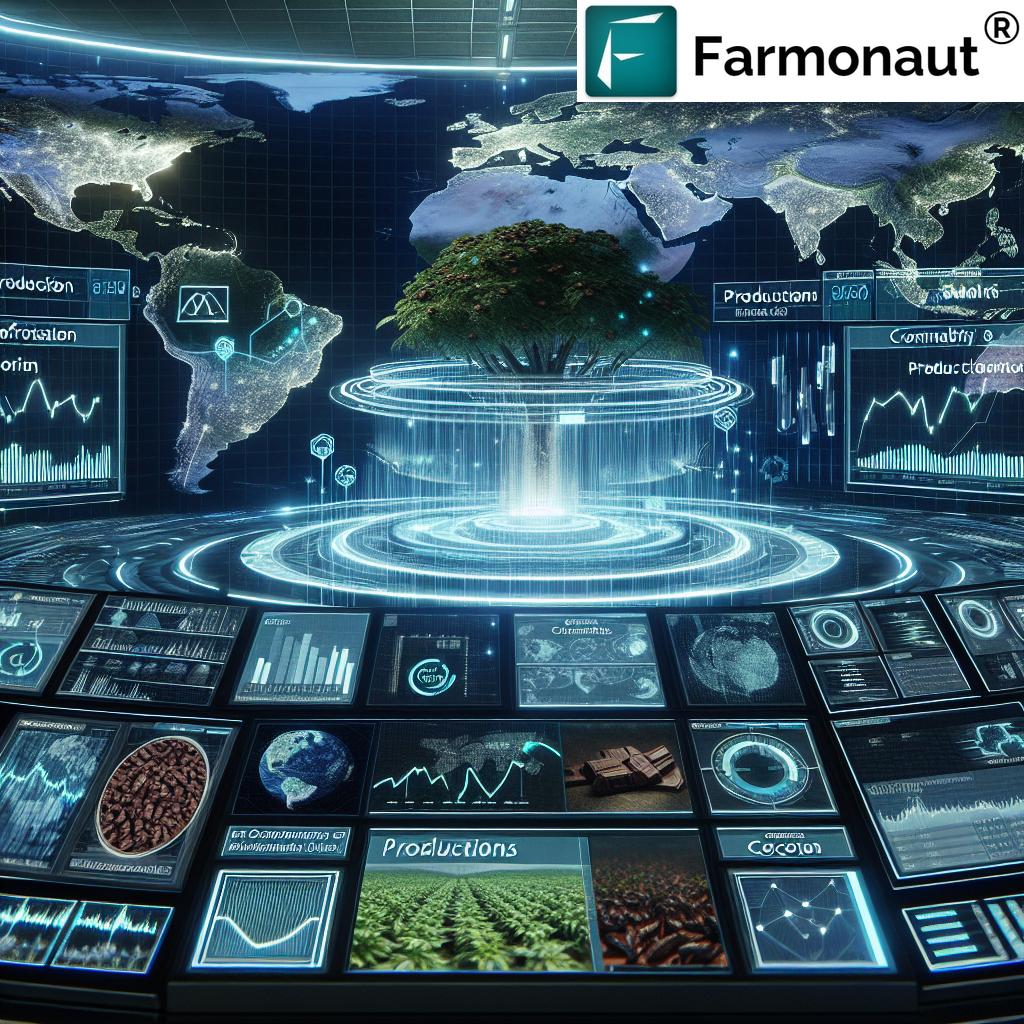EU Deforestation Regulation: How Farmonaut’s Agritech Solutions Drive Sustainable Supply Chains and Forest Conservation
“The EU Deforestation Regulation aims to transform sustainable agricultural commodities and deforestation-free supply chains by 2025.”
In an era where environmental concerns are at the forefront of global discussions, the European Union has taken a bold step towards combating deforestation with its landmark EU Deforestation Regulation (EUDR). This groundbreaking initiative is set to revolutionize the way we approach sustainable agricultural commodities and deforestation-free supply chains by 2025. As we delve into this crucial topic, we’ll explore how innovative agritech solutions, particularly those offered by Farmonaut, are playing a pivotal role in supporting businesses to comply with these new regulations and drive positive change in forest conservation efforts.
Understanding the EU Deforestation Regulation
The EUDR represents a significant shift in policy aimed at addressing the environmental impact of global trade. Its primary objective is to combat tropical forest destruction linked to key imports such as cocoa, coffee, palm oil, and timber. This regulation will have far-reaching implications for various sectors, including agriculture, finance, and manufacturing, fostering greater environmental responsibility across the board.
Key aspects of the EUDR include:
- Mandatory due diligence for companies importing or exporting specific commodities
- Traceability requirements to ensure products are not linked to deforested areas
- Stringent reporting and verification processes
- Potential fines and market exclusions for non-compliant entities
As we navigate through these new requirements, it’s clear that technology will play a crucial role in enabling businesses to adapt and thrive in this new regulatory landscape.
The Role of Agritech in Sustainable Supply Chains
In the face of these regulatory changes, agricultural technology, or agritech, emerges as a beacon of hope for businesses striving to achieve compliance and sustainability. Farmonaut, a pioneer in this field, offers cutting-edge solutions that align perfectly with the goals of the EUDR.
Our satellite-based farm management solutions provide invaluable tools for monitoring and managing agricultural lands responsibly. By leveraging advanced technologies such as satellite imagery, artificial intelligence, and blockchain, we empower stakeholders across the supply chain to make informed decisions that support sustainable practices and forest conservation.

Farmonaut’s Contribution to EUDR Compliance
At Farmonaut, we’ve developed a suite of tools specifically designed to address the challenges posed by the EUDR. Our solutions help businesses in several key areas:
- Traceability: Our blockchain-based system ensures transparency throughout the supply chain, from farm to consumer.
- Monitoring: Real-time satellite imagery allows for continuous monitoring of land use, helping to prevent deforestation.
- Data Analysis: Advanced AI algorithms process vast amounts of data to provide actionable insights on sustainable practices.
- Reporting: Automated reporting tools simplify the process of documenting compliance with EUDR requirements.
By integrating these technologies, we’re not just helping businesses meet regulatory standards; we’re driving a fundamental shift towards more sustainable and responsible agricultural practices.
The Impact on Various Sectors
The EUDR’s influence extends far beyond just agriculture. Let’s explore how different sectors are affected and how Farmonaut’s solutions can help:
Agriculture and Forestry
For farmers and forestry companies, the EUDR means a radical shift in land management practices. Our satellite-based crop health monitoring system allows for precise tracking of vegetation health, soil moisture levels, and other critical metrics. This data-driven approach not only supports compliance but also optimizes resource use, leading to more sustainable farming practices.
Food and Beverage Industry
Companies in this sector must ensure their supply chains are free from deforestation-linked products. Farmonaut’s traceability solutions provide a robust system for tracking the journey of agricultural commodities from farm to shelf, ensuring compliance and building consumer trust.
Retail and Distribution
Retailers and distributors play a crucial role in implementing EUDR requirements. Our platform offers tools for supply chain management and product verification, helping these businesses maintain compliance throughout their operations.
Financial Institutions
Banks and investors are increasingly scrutinizing the environmental impact of their portfolios. Farmonaut’s data analytics capabilities provide valuable insights for assessing the sustainability of agricultural investments, aligning financial decisions with EUDR objectives.
The Forest 500 Initiative: A Complementary Effort
“The Forest 500 initiative monitors compliance and improves transparency for key imports like cocoa, coffee, palm oil, and timber.”
Working alongside regulatory efforts like the EUDR, the Forest 500 initiative plays a crucial role in monitoring compliance and improving transparency in commodity supply chains. This global ranking identifies and assesses the most influential companies and financial institutions in forest-risk commodity supply chains.
At Farmonaut, we recognize the importance of such initiatives in driving change. Our technology supports the goals of Forest 500 by providing accurate, real-time data on land use and agricultural practices. This synergy between regulatory frameworks, monitoring initiatives, and technological solutions is key to achieving meaningful progress in forest conservation.
Challenges and Opportunities
While the EUDR presents significant challenges for businesses, it also opens up new opportunities for innovation and sustainable growth. Some of the key challenges include:
- Adapting existing supply chains to meet new traceability requirements
- Implementing new technologies and processes for monitoring and reporting
- Managing the costs associated with compliance
- Navigating complex international trade regulations
However, these challenges also present opportunities for companies to:
- Differentiate themselves in the market through sustainable practices
- Improve operational efficiency through better data management
- Build stronger relationships with environmentally conscious consumers
- Contribute to global efforts in combating climate change
Farmonaut’s agritech solutions are designed to help businesses navigate these challenges and capitalize on the opportunities presented by the EUDR.

Implementing Cutting-Edge Agricultural Sustainability Technologies
As we move towards a more sustainable future, the implementation of advanced agricultural technologies becomes crucial. Farmonaut is at the forefront of this technological revolution, offering solutions that not only address EUDR compliance but also promote overall agricultural sustainability.
Satellite-Based Crop Health Monitoring
Our satellite imagery technology provides real-time insights into crop health, allowing farmers and agribusinesses to make data-driven decisions. This not only optimizes yield but also ensures responsible land use, a key factor in preventing deforestation.
AI-Powered Advisory Systems
Farmonaut’s AI-driven advisory system, Jeevn AI, delivers personalized recommendations to farmers, helping them implement sustainable practices while maximizing productivity. This technology is crucial in balancing economic needs with environmental conservation.
Blockchain for Supply Chain Transparency
Our blockchain-based traceability solutions ensure that every step of the agricultural supply chain is transparent and verifiable. This is essential for companies looking to prove compliance with EUDR requirements and build trust with consumers.
The Future of Sustainable Commodity Production
As we look towards the future, it’s clear that sustainable commodity production will be shaped by regulations like the EUDR and technologies like those offered by Farmonaut. We anticipate several key trends:
- Increased adoption of precision agriculture techniques
- Greater emphasis on data-driven decision making in farming
- Expansion of regenerative agricultural practices
- Growing consumer demand for transparently sourced products
- Closer collaboration between technology providers and agricultural stakeholders
These trends point towards a future where agriculture not only meets global food demands but does so in a way that actively contributes to environmental conservation.
Impact on International Trade and Environmental Protection
The EUDR is set to have a significant impact on international trade patterns, particularly for countries exporting agricultural commodities to the EU. This regulation may lead to:
- Shifts in global supply chains as companies seek compliant suppliers
- Increased investment in sustainable agricultural practices in developing countries
- Potential trade barriers for non-compliant products
- Greater harmonization of environmental standards across different markets
From an environmental protection standpoint, the EUDR, supported by technologies like Farmonaut’s, has the potential to:
- Significantly reduce deforestation rates in tropical regions
- Promote biodiversity conservation
- Contribute to global climate change mitigation efforts
- Encourage more sustainable land use practices worldwide
EU Deforestation Regulation Impact Assessment
| Sector/Commodity | Estimated Annual Deforestation Impact (hectares) | EUDR Compliance Requirements | Farmonaut’s Solution | Potential Sustainability Improvements (%) |
|---|---|---|---|---|
| Palm Oil | 270,000 | Traceability to plantation level, No-deforestation certification | Satellite monitoring, Blockchain traceability | 40-60% |
| Cocoa | 150,000 | Supply chain mapping, Sustainable sourcing verification | AI-powered advisory, Traceability solutions | 30-50% |
| Timber | 200,000 | Legal harvesting proof, Chain of custody documentation | Satellite imagery for forest monitoring, Blockchain verification | 50-70% |
| Soy | 480,000 | Zero-deforestation commitment, Supply chain transparency | Crop health monitoring, AI-driven land use optimization | 35-55% |
| Coffee | 100,000 | Agroforestry practices, Sustainable cultivation certification | Precision agriculture tools, Advisory systems | 25-45% |
| Rubber | 85,000 | Sustainable tapping practices, Deforestation-free sourcing | Satellite-based land use monitoring, Traceability solutions | 30-50% |
This table illustrates the significant impact of various commodities on deforestation and how Farmonaut’s solutions can contribute to substantial improvements in sustainability. By leveraging our technology, businesses can not only comply with EUDR requirements but also achieve meaningful reductions in their environmental footprint.
Farmonaut’s Commitment to Sustainable Agriculture
At Farmonaut, we’re committed to driving sustainable agriculture through innovative technology. Our platform is designed to empower farmers, agribusinesses, and policymakers with the tools they need to make informed, environmentally responsible decisions.
Explore our solutions:
For developers interested in integrating our technology into their own solutions, we offer a comprehensive API. Detailed documentation is available in our API Developer Docs.
Conclusion: A Sustainable Future Through Technology and Regulation
The EU Deforestation Regulation represents a pivotal moment in our global effort to combat deforestation and promote sustainable agricultural practices. As we’ve explored, the challenges posed by this regulation are significant, but so are the opportunities for positive change.
Farmonaut’s agritech solutions stand at the forefront of this transformation, offering powerful tools to help businesses navigate the complexities of EUDR compliance while driving genuine sustainability improvements. From satellite-based monitoring to AI-powered advisory systems and blockchain traceability, our technology empowers stakeholders across the agricultural supply chain to make informed, environmentally responsible decisions.
As we move forward, the synergy between regulatory frameworks like the EUDR, monitoring initiatives like Forest 500, and innovative technologies will be crucial in shaping a more sustainable future for agriculture and forest conservation. By embracing these changes and leveraging the power of agritech, we can create a world where agricultural productivity and environmental protection go hand in hand.
The journey towards sustainable, deforestation-free supply chains is complex, but with the right tools and commitment, it’s a goal within our reach. At Farmonaut, we’re proud to be part of this important transformation, and we remain dedicated to developing solutions that will help create a more sustainable, environmentally responsible agricultural sector for generations to come.
FAQs
- What is the EU Deforestation Regulation (EUDR)?
The EUDR is a landmark initiative aimed at combating tropical forest destruction linked to key imports like cocoa, coffee, palm oil, and timber. It sets requirements for traceability and sustainable sourcing of these commodities. - How does Farmonaut help businesses comply with the EUDR?
Farmonaut offers satellite-based monitoring, AI-powered advisory systems, and blockchain traceability solutions that help businesses track their supply chains, verify sustainable practices, and meet EUDR reporting requirements. - What sectors are most affected by the EUDR?
The EUDR primarily affects agriculture, forestry, food and beverage, retail, distribution, and financial sectors that deal with or invest in forest-risk commodities. - How can satellite technology contribute to forest conservation?
Satellite technology enables real-time monitoring of land use changes, helping to detect and prevent deforestation. It also supports precision agriculture, which can reduce the need for expanding agricultural land. - What is the Forest 500 initiative?
Forest 500 is a global ranking that assesses the most influential companies and financial institutions in forest-risk commodity supply chains, complementing regulatory efforts like the EUDR.






